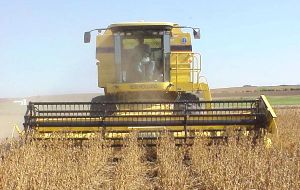MercoPress. South Atlantic News Agency
Soy boom brings wealth, at a price
 Large investments have been made in soybean processing
Large investments have been made in soybean processing Few towns in Paraguay's impoverished countryside have a stoplight, well-paved roads or a library. This remote farming community has all three, and residents cite one reason: soybeans.
Feeding growing demand from China, soybean cultivation is booming in Paraguay, the world's fourth-largest exporter, bringing prosperity to one of South America's poorest countries. The bonanza has also unleashed a national debate. Big producers herald it as Paraguay's best engine for development; critics say it threatens the environment and the livelihood of thousands of small farmers in a predominantly agricultural country. "The best business in the world is, without a doubt, grains production. We are rich in agricultural potential, we just don't know how to exploit it," said Tranquilo Favero, a native Brazilian who is Paraguay's biggest individual soy producer. "Soy means progress," he said. The benefits of the boom are on full display in this town of 12,000 located in the heart of Paraguay's main soy-growing region in the Itapuá department, 370 kilometres south of Asunción, the capital. Shiny new pick-up trucks cruise the streets in Obligado, rolling past stores offering the latest models in brand name washing machines and mobile phones. Soybean exports by the local cooperative â€" one of the country's most organized, grouping some 3,500 small and medium-sized farmers â€" are the motor of the town's economy. "Everyone here lives off of soy â€" the butcher, school teachers, shopowners," said Eugenio Closs, a spokesman for the co-op. The other sideBut kilometres away, down red dirt roads, small farmers living in wooden shacks on parcels of land struggle to survive. Many are subsistence farmers and have abandoned cultivating soy on their plots, saying the heavy machinery and pesticides it requires makes growing the crop less profitable. Farmer Misdonio Benítez, 51, said he shifted from growing soy to cotton three years ago. "It was the only way my whole family could work the land." Some farmers, frustrated they couldn't make ends meet, sold their land to big producers, adding to disparities in a country where more than 74 percent of the land is owned by two percent of the population. "They (big land owners) have the means to produce, own the best lands and leave us small farmers by the wayside," said Benítez. Many farmers who choose put their land up for sale migrate to cities in search of work in a country with little industry and where 40 percent of the population lives in poverty. Toxic pesticides and the increasing clearing of lands to plant soybeans are also raising environmental questions, experts say. "If we take into account the social costs, soy is doing more harm than good," said Tomas Palau, a sociologist and political analyst in Asuncion who advises peasant groups. Golden eggs Paraguay ranks behind the United States, Brazil and Argentina in soy production. This year, thanks to good weather, Paraguayan farmers harvested a record 6.5 million tons. While global demand for soybeans is driven by China, Paraguay does not have diplomatic relations with one of its major end markets, exporting most of its soybeans through Brazil and Argentina or Uruguay. Paraguay's main cash crop, soybeans generate some US$600 million in export income and represents more than 30 percent of total exports. But much of the money ends up in the hands of producers, most of them Brazilian, and little in state coffers, critics say. The Paraguayan economy relies heavily on soy and beef exports. An underground economy of smuggled and counterfeit goods also flourishes, estimated to be around the same size as the official one. Corruption and tax evasion are rampant. The soy boom has left some worrying the country is developing a soy dependency. "If we don't diversify, our fortunes will always be tied to international commodity prices," said Fernando Masi, a senior economist at the Centre for Analysis of the Paraguayan Economy. With many soy producers seeing profits, the cash-hungry government has said it wants to impose taxes on soy exports, mirroring a move already in place in neighbouring Argentina. But producers have resisted, arguing a 10 percent value-added tax they pay on gasoline and farm machinery is helping to spread soy's benefits. Facing a backlash from producers, the government recently backtracked on the tax proposal. "It would put the brakes on production. That would be killing the goose that lays the golden egg," said Favero. (Reuteurs)




Top Comments
Disclaimer & comment rulesCommenting for this story is now closed.
If you have a Facebook account, become a fan and comment on our Facebook Page!